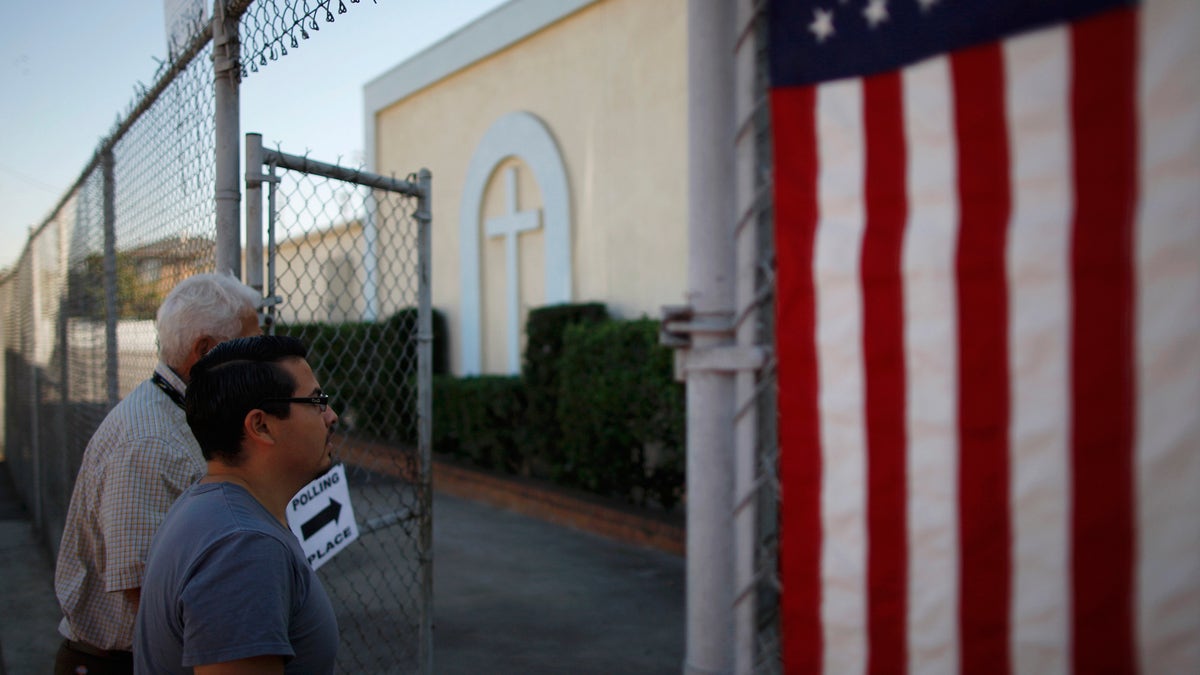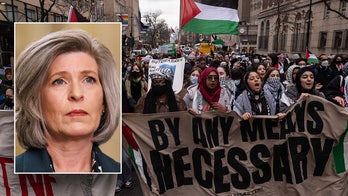
LOS ANGELES, CA - NOVEMBER 6: People enter a polling place in the heavily Latino East L.A. area during the U.S. presidential election on November 6, 2012 in Los Angeles, California. The election will decide whether Democrat Barack Obama serves a second term as president of the United States or is replaced by Republican rival, former Massachusetts Gov. Mitt Romney. (Photo by David McNew/Getty Images) (2012 Getty Images)
Philadelphia – Joaquín Castro had less than an hour to make his way through the snarled traffic of Center City and down to the Wells Fargo Center in South Philadelphia before the roll call to choose Hillary Clinton as this year’s Democratic presidential nominee.
But the tight schedule on Tuesday didn’t prevent the Texas congressman from making a quick stop at the Caplan Center for Performing Arts on South Broad St., where Castro addressed a group of potential voters who are arguably the most important demographic for Clinton’s hope of securing the presidency come November.
Castro, along with fellow congressman Joe Kennedy of Massachusetts, spoke to a group gathered for an event held by the organization Voto Latino on issues facing the Hispanic community and the importance of going to the polls on Election Day.
“The more we register, the more we are able to participate in the political process,” María Teresa Kumar, the president of Voto Latino, said at the event.
Throughout the city of Philadelphia, which is hosting this year’s Democratic National Convention, surrogates and supporters of Clinton have been making the rounds of meetings, events and caucuses in the hope of rallying Latinos to register to vote and to educate themselves on the political process.
An hour before Castro spoke to the Voto Latino, his twin brother, Housing and Urban Development Secretary Julían Castro, was one block north speaking to a group of Latino leaders at the Crystal Tea Room about the importance of the Hispanic vote.
“I’m confident Latino voter turnout will go up significantly,” the HUD secretary told a group of reporters following his speech. “We see it in the registrations that are happening in different states. I believe it can go into the 50’s and if that happens then particularly in swing states like Florida, Colorado Nevada and even Virginia, where there is a growing Latino population, Hillary Clinton will win those.”
That’s the hope of the Clinton campaign: that spurred by Republican presidential nominee Donald Trump’s controversial language on immigration and the Democratic Party’s push to register Latino voters, the Hispanic community will come to the polls in droves this fall.
In the past, however, this has not been the case.
In the 2012 presidential match-up between Barack Obama and Republican Mitt Romney, less than half (48 percent) of registered Latino voters showed up on Election Day – a figure that has remained relatively unchanged over the last four presidential elections and on par with how non-Hispanic whites voted in the 2010 midterm elections.
Much has been made this election year about the record 27 million Latinos eligible to vote and there has some anecdotal evidence that Trump’s call to deport 11 million undocumented immigrants and build a wall along the U.S.-Mexico border has prompted many Latinos to register to vote.
Hard numbers, however, on registrations are tough to find (although figures collected by the California firm Political Data found that by April registration nationwide among Latinos was up 98 percent since January) and Clinton surrogates in Philadelphia this week don’t seem to be taking anything for granted when it comes to the group’s voting habits.
“Our weakness in this country is that in the past there have been Latinos who are eligible to vote who are not registered to vote,” Rep. Linda Sanchez of California to the Hispanic Caucus at the DNC on Wednesday. “The only way we’re going to get the problems in our community addressed is to increase our numbers.”
Sanchez, who called the Latino “sleeping giant” that “has woken up,” added that she believes Clinton’s positions on issues like immigration, the economy and education will spur Latinos to go out and vote for her this November.
While the Democrats in Philadelphia may be already preaching to the converted, Clinton campaign staffers say their colleagues in her offices throughout the U.S. – particularly in battlegrounds like Nevada and Florida – are actively working to register as many Latinos as they can and educate them on how to vote in November.
Through its surrogates, local offices and social media, the Clinton campaign says it offering tutorials to first-time voters on where and how to go to the polls.
“There are states with Voter ID laws that make the process difficult so that’s why we got into those states early,” said Amanda Renteria, Clinton’s national political director. “We’ve given the local offices the tools and now we let the states craft their own plan.”
Along with the question over how many Latinos will vote in November, is one about the percentage that will vote for Clinton vs. Trump.
In 2004, then-incumbent President George W. Bush hit what is considered the high water mark for Republicans with Latinos when he took home about 44 percent of the Hispanic vote against Democrat John Kerry. Following Mitt Romney’s 2012 defeat to Barack Obama, the GOP released an autopsy report in which they found one of the key reasons why Romney lost the presidential election was because he only captured 27 percent of the Latino vote.
Experts say that if Trump can make draw in strong numbers from his base of white, working-class voters then he might not need much of the Latino vote to win the presidency.
That’s why Clinton’s Hispanic surrogates have been urgently pleading with their fellow Democrats to go out and vote. To them, things have gotten personal.
“We have a lot riding on this election,” Sanchez said.




